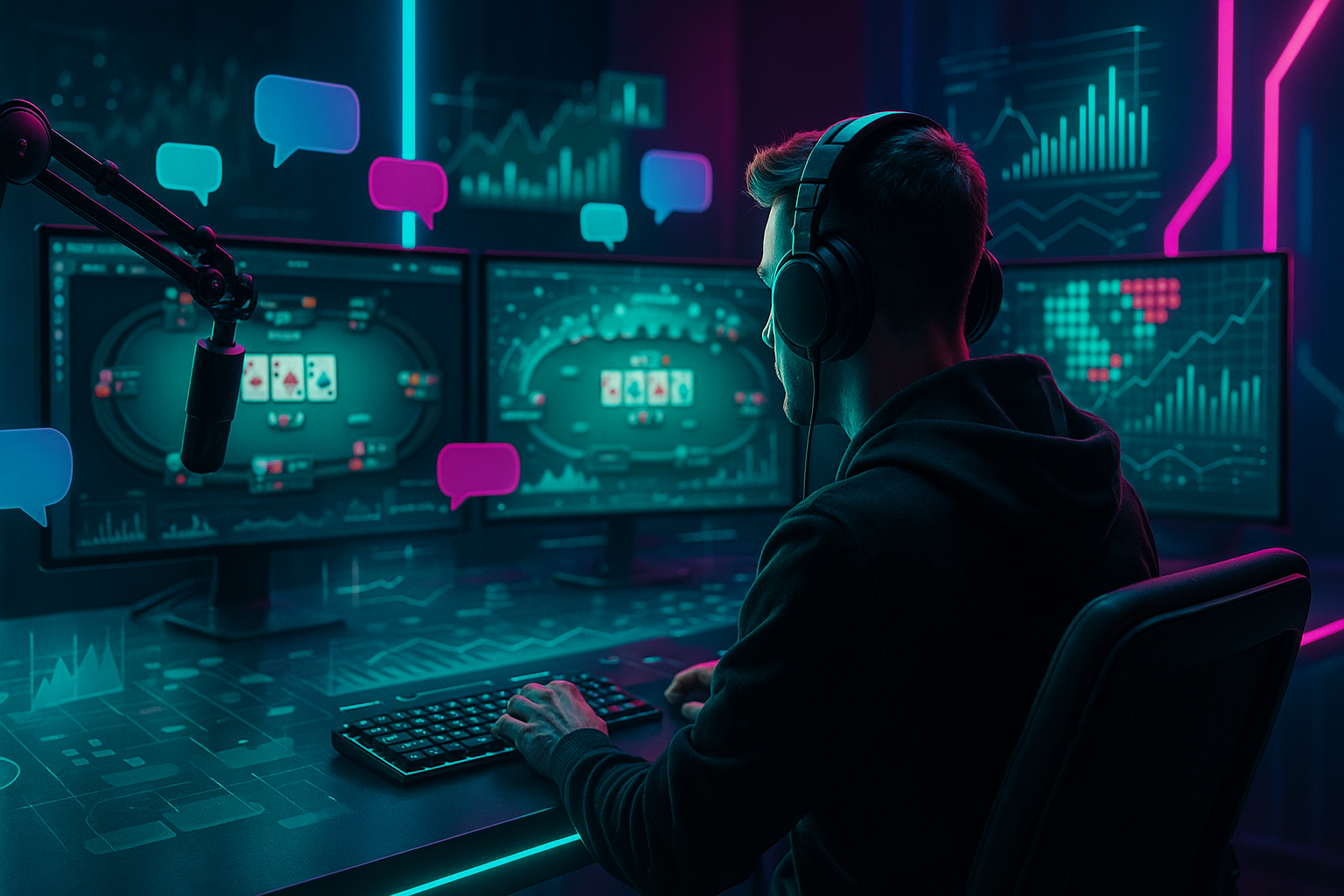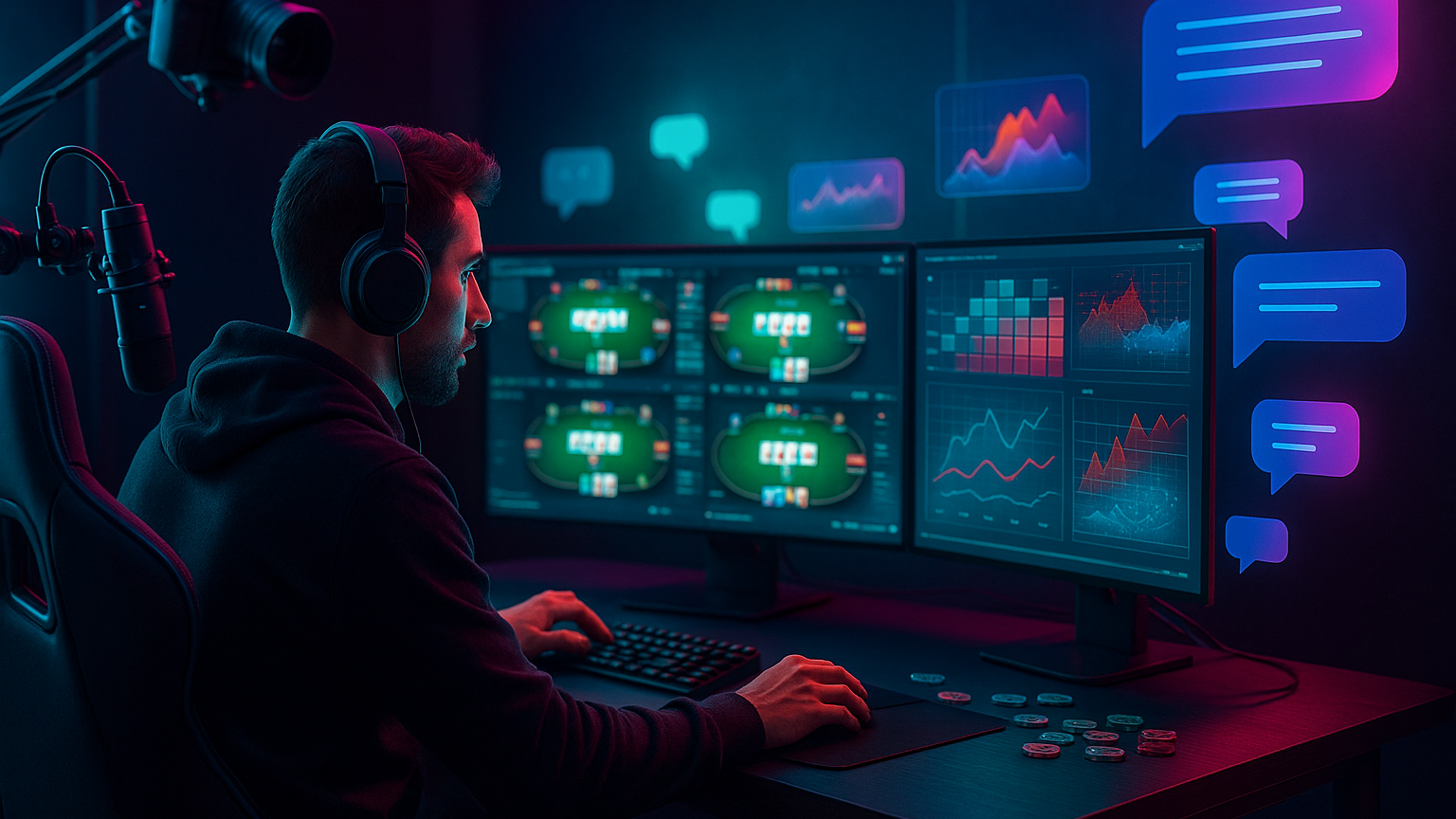The shift from traditional poker coverage to streaming represents more than just a technological upgrade. Elias "ZerosPoker" Gutierrez is currently the top-ranked poker streamer. The high-stakes Spanish poker streamer, who is based in Tokyo, Japan, averaged more than 4,500 viewers to gain the #1 ranking. This consistent viewership demonstrates the substantial audience that has migrated from passive television consumption to active streaming engagement.
From Televised Highlights to Real-Time Strategy
Traditional poker television programming offered viewers carefully curated content, showing only the most dramatic moments and final table action. Streaming platforms revolutionized this approach by providing unfiltered access to professional decision-making processes. Lex "LexVeldhuis" Veldhuis has been a fixture on the online poker scene for a long time and currently represents PokerStars in the #2 spot in the top ten Twitch streams. He plays an average of $40K monthly in buy-ins and pulls in an average of more than 3,300 viewers.
The transparency offered by streaming created an unprecedented educational opportunity. Unlike television broadcasts focused on entertainment value, streams became comprehensive learning platforms where viewers could observe complete sessions, including mundane hands and strategic adjustments. This shift democratized poker education, making high-level instruction accessible to anyone with an internet connection.
The Educational Revolution Through Streaming
Streaming platforms transformed poker education from expensive private coaching sessions to freely accessible masterclasses. As the founder of the poker training site Raise Your Edge, Benjamin "bencb" Rolle straddles both the player and industry sides. He uses his fourth-place popularity on Twitch (RaiseYourEdge) to showcase his poker skills on the virtual felt, run sims, and provide training.
The educational impact extends beyond individual streamers to comprehensive training ecosystems. Modern poker education emphasizes active learning over passive consumption. Action is the most outstanding teacher, so studying a piece of training material doesn't cut it. Have you ever read three poker book chapters in one sitting but failed to actively practice anything you learned in those three chapters?
Players seeking to improve their skills often transition from watching streams to testing strategies on the most popular online poker platforms in USA, where they can apply the lessons learned from top streamers in real competitive environments. These platforms provide comprehensive databases of games, player statistics, and analytical tools that complement the theoretical knowledge gained through streaming content.
Behavioral Changes in the Streaming Era
The psychological impact of streaming on competitive poker extends far beyond educational benefits. Research demonstrates that being observed fundamentally alters player behavior and decision-making processes. The results showed that anger reduced the accuracy of mathematical decision-making only when participants were "being watched" by a pair of moving eyes. Experienced poker players made mathematically more accurate decisions than inexperienced ones.

This "observer effect" creates a fascinating dynamic in streamed poker sessions. Players become more conscious of their image and decision-making processes when they know thousands of viewers analyze their every move. The Internet changes poker gaming behavior. It enables a larger number of hands to be played and gives access to technical tools (additional software) that can support the skills needed and improve game mastery.
The accountability factor inherent in streaming often leads to improved play quality. When players know their decisions are scrutinized in real-time chat and potentially reviewed later, they tend to make more calculated, strategic choices rather than impulsive emotional decisions.
The Business Evolution of Poker Content
The streaming revolution created entirely new revenue models within the poker ecosystem. Professional players discovered they could monetize their expertise through subscriptions, sponsorships, and affiliate partnerships, reducing their dependence solely on tournament winnings and cash game profits.
Rolle doesn't play in live events very often (his best live result: $45,310 for coming third at the 2017 PokerStars Championship in Barcelona), but he is a multi-millionaire online poker player, with online winnings totaling over $35 million and a $4 million net profit in 2024 alone (gipsyteam.com). With various sponsorship and ambassador deals, it's safe to say Ben Rolle is the real deal.
This diversification of income streams allowed skilled players to build sustainable careers beyond pure gambling profits. The creator economy aspect of poker streaming enabled players to develop personal brands, educational content, and community engagement that generated consistent revenue regardless of short-term playing results.
Major poker operators recognized the marketing potential of streaming platforms. Companies began launching dedicated streaming channels and partnering with popular content creators to reach new demographics and maintain engagement with existing players. This symbiotic relationship between operators and streamers helped legitimize poker streaming as a professional endeavor.
Technology Integration and Future Developments
Integrating advanced analytics and artificial intelligence tools has enhanced the educational value of poker streams. Parallel to these developments, artificial intelligence (AI) has ventured into online poker with remarkable outcomes. Pluribus's AI program achieved superhuman performance in six-player no-limit Texas Hold'em poker in 2019. The program displayed an ability to defeat elite human professionals consistently and showcased distinctive strategic plays such as high-frequency donk betting, which deviates sharply from conventional human play.
Modern streaming setups incorporate real-time statistical analysis, range visualization tools, and solver-based strategy recommendations. These technological enhancements give viewers more profound insights into optimal play and help bridge the theoretical knowledge and practical application gap.
The streaming era has fundamentally altered competitive poker by democratizing education, changing player psychology, and creating new economic opportunities within the industry. What began as simple gameplay broadcasts evolved into comprehensive educational platforms serving entertainment and instructional purposes.
As technology advances and streaming platforms develop new features, the relationship between poker, education, and entertainment will likely become even more intertwined, ensuring that the streaming revolution's impact on competitive poker remains a defining characteristic of the modern game.
The transformation from closed-door competition to transparent, interactive learning environments represents one of the most significant developments in poker's evolution, creating opportunities for skill development and community engagement that were previously impossible in traditional poker settings.




